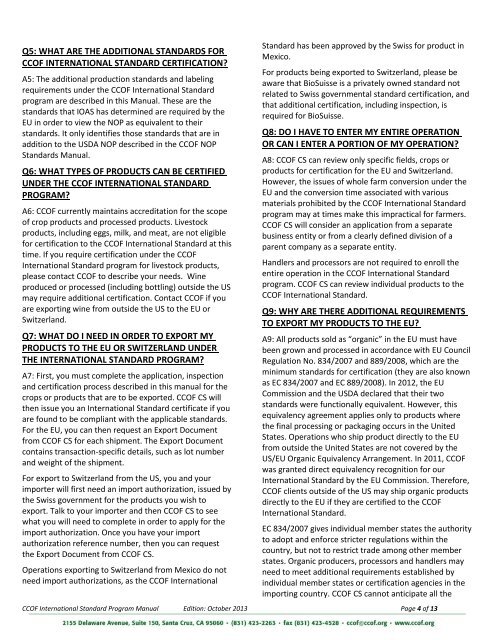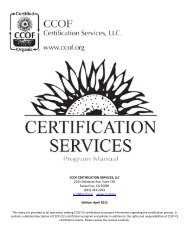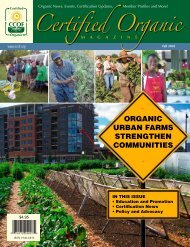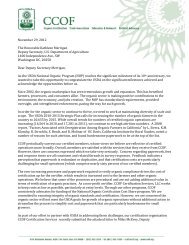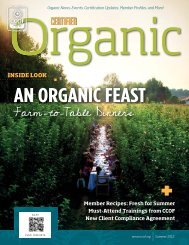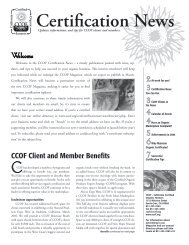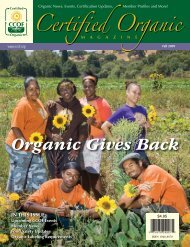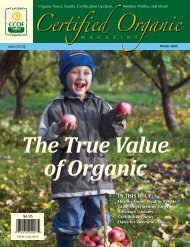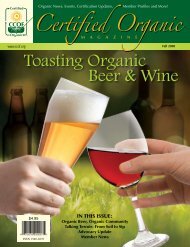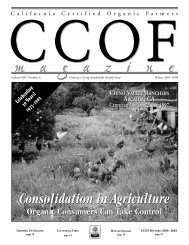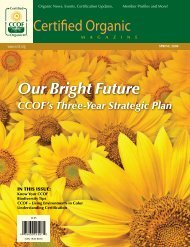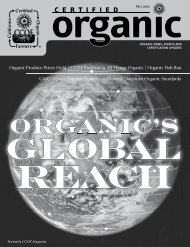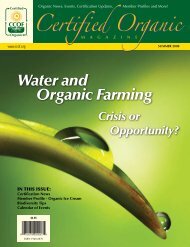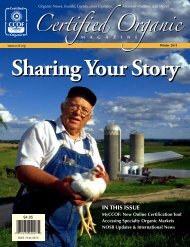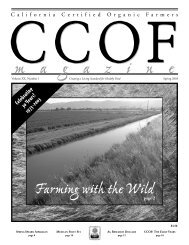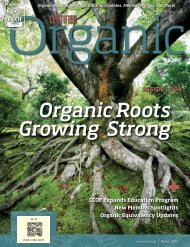CCOF International Standard Progam Manual DISINTEGRATED
CCOF International Standard Progam Manual DISINTEGRATED
CCOF International Standard Progam Manual DISINTEGRATED
Create successful ePaper yourself
Turn your PDF publications into a flip-book with our unique Google optimized e-Paper software.
Q5: WHAT ARE THE ADDITIONAL STANDARDS FOR<br />
<strong>CCOF</strong> INTERNATIONAL STANDARD CERTIFICATION<br />
A5: The additional production standards and labeling<br />
requirements under the <strong>CCOF</strong> <strong>International</strong> <strong>Standard</strong><br />
program are described in this <strong>Manual</strong>. These are the<br />
standards that IOAS has determined are required by the<br />
EU in order to view the NOP as equivalent to their<br />
standards. It only identifies those standards that are in<br />
addition to the USDA NOP described in the <strong>CCOF</strong> NOP<br />
<strong>Standard</strong>s <strong>Manual</strong>.<br />
Q6: WHAT TYPES OF PRODUCTS CAN BE CERTIFIED<br />
UNDER THE <strong>CCOF</strong> INTERNATIONAL STANDARD<br />
PROGRAM<br />
A6: <strong>CCOF</strong> currently maintains accreditation for the scope<br />
of crop products and processed products. Livestock<br />
products, including eggs, milk, and meat, are not eligible<br />
for certification to the <strong>CCOF</strong> <strong>International</strong> <strong>Standard</strong> at this<br />
time. If you require certification under the <strong>CCOF</strong><br />
<strong>International</strong> <strong>Standard</strong> program for livestock products,<br />
please contact <strong>CCOF</strong> to describe your needs. Wine<br />
produced or processed (including bottling) outside the US<br />
may require additional certification. Contact <strong>CCOF</strong> if you<br />
are exporting wine from outside the US to the EU or<br />
Switzerland.<br />
Q7: WHAT DO I NEED IN ORDER TO EXPORT MY<br />
PRODUCTS TO THE EU OR SWITZERLAND UNDER<br />
THE INTERNATIONAL STANDARD PROGRAM<br />
A7: First, you must complete the application, inspection<br />
and certification process described in this manual for the<br />
crops or products that are to be exported. <strong>CCOF</strong> CS will<br />
then issue you an <strong>International</strong> <strong>Standard</strong> certificate if you<br />
are found to be compliant with the applicable standards.<br />
For the EU, you can then request an Export Document<br />
from <strong>CCOF</strong> CS for each shipment. The Export Document<br />
contains transaction-specific details, such as lot number<br />
and weight of the shipment.<br />
For export to Switzerland from the US, you and your<br />
importer will first need an import authorization, issued by<br />
the Swiss government for the products you wish to<br />
export. Talk to your importer and then <strong>CCOF</strong> CS to see<br />
what you will need to complete in order to apply for the<br />
import authorization. Once you have your import<br />
authorization reference number, then you can request<br />
the Export Document from <strong>CCOF</strong> CS.<br />
Operations exporting to Switzerland from Mexico do not<br />
need import authorizations, as the <strong>CCOF</strong> <strong>International</strong><br />
<strong>Standard</strong> has been approved by the Swiss for product in<br />
Mexico.<br />
For products being exported to Switzerland, please be<br />
aware that BioSuisse is a privately owned standard not<br />
related to Swiss governmental standard certification, and<br />
that additional certification, including inspection, is<br />
required for BioSuisse.<br />
Q8: DO I HAVE TO ENTER MY ENTIRE OPERATION<br />
OR CAN I ENTER A PORTION OF MY OPERATION<br />
A8: <strong>CCOF</strong> CS can review only specific fields, crops or<br />
products for certification for the EU and Switzerland.<br />
However, the issues of whole farm conversion under the<br />
EU and the conversion time associated with various<br />
materials prohibited by the <strong>CCOF</strong> <strong>International</strong> <strong>Standard</strong><br />
program may at times make this impractical for farmers.<br />
<strong>CCOF</strong> CS will consider an application from a separate<br />
business entity or from a clearly defined division of a<br />
parent company as a separate entity.<br />
Handlers and processors are not required to enroll the<br />
entire operation in the <strong>CCOF</strong> <strong>International</strong> <strong>Standard</strong><br />
program. <strong>CCOF</strong> CS can review individual products to the<br />
<strong>CCOF</strong> <strong>International</strong> <strong>Standard</strong>.<br />
Q9: WHY ARE THERE ADDITIONAL REQUIREMENTS<br />
TO EXPORT MY PRODUCTS TO THE EU<br />
A9: All products sold as “organic” in the EU must have<br />
been grown and processed in accordance with EU Council<br />
Regulation No. 834/2007 and 889/2008, which are the<br />
minimum standards for certification (they are also known<br />
as EC 834/2007 and EC 889/2008). In 2012, the EU<br />
Commission and the USDA declared that their two<br />
standards were functionally equivalent. However, this<br />
equivalency agreement applies only to products where<br />
the final processing or packaging occurs in the United<br />
States. Operations who ship product directly to the EU<br />
from outside the United States are not covered by the<br />
US/EU Organic Equivalency Arrangement. In 2011, <strong>CCOF</strong><br />
was granted direct equivalency recognition for our<br />
<strong>International</strong> <strong>Standard</strong> by the EU Commission. Therefore,<br />
<strong>CCOF</strong> clients outside of the US may ship organic products<br />
directly to the EU if they are certified to the <strong>CCOF</strong><br />
<strong>International</strong> <strong>Standard</strong>.<br />
EC 834/2007 gives individual member states the authority<br />
to adopt and enforce stricter regulations within the<br />
country, but not to restrict trade among other member<br />
states. Organic producers, processors and handlers may<br />
need to meet additional requirements established by<br />
individual member states or certification agencies in the<br />
importing country. <strong>CCOF</strong> CS cannot anticipate all the<br />
<strong>CCOF</strong> <strong>International</strong> <strong>Standard</strong> Program <strong>Manual</strong> Edition: October 2013 Page 4 of 13


